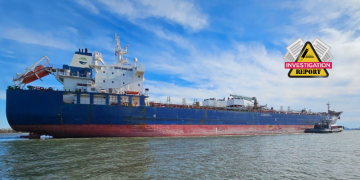The Seafarers’ Charity has released on March 8th (International Women’s Day), a report on the welfare needs of women working on cargo ships.
The research reveals women seafarers’ experience of exclusion, isolation and fear of sexual harassment and assault from their male colleagues. In their own words, the 30 women who contributed to the research, describe their experiences of discrimination and harassment from their male colleagues – both those in superior roles, as well as of the same status and subordinate.
Key issues identified within the report:
- women seafarers’ concerns about their personal safety,
- their feelings of fear and isolation
- the fundamental lack of practical facilities to support menstruation.
The Port-Based Welfare Needs of Women Seafarers report by Professor Helen Sampson and Dr Iris Acejo at the Seafarers International Research Centre, Cardiff University was funded by The Seafarers’ Charity.
The research identifies that women working on cargo ships are likely to require more support from port welfare services because they suffer high levels of fear and loneliness while working in a male-dominated environment at sea. For these women, port welfare services can offer an escape from feeling isolated on board, as well as a friendly face and the potential for external support to address issues with male colleagues.
Women are in a minority on board cargo ships, but this shouldn’t mean their needs are ignored.
… said Deborah Layde, Chief Executive at The Seafarers’ Charity and Chair of Maritime UK’s Women in Maritime Network
While the minority status of women seafarers creates the context for many of the problems experienced, it also gives rise to a greater need for support of their welfare and personal safety. Unfortunately, it is regrettable that women’s minority status also contributes to their welfare needs remaining unmet within a sector predominantly focused on supporting the welfare needs of a male workforce.
Fear and Isolation
Women seafarers in this research face specific issues which cause them to feel alienated in a very male space where they feel they don’t belong. They are more fearful and more isolated than their male colleagues, resulting in greater feelings of stress. Underpinning these feelings is their fear of sexual harassment and concerns about their personal safety while working at sea. Such feelings caused women seafarers to exclude themselves from social activities on board to avoid the potential for gossip or the risk of harassment. The very act of self-isolation causes women seafarers to experience an even more solitary existence at sea and reveals a greater need for welfare support for women from outside of the immediate crew and management structure.
Personal Safety & Sexual Harassment
Of the 30 women seafarers interviewed for the research, the majority described incidents of sexual harassment at work. For many women seafarers, sexual harassment is relatively commonplace, and a potentially traumatising, event. Most frequently, harassment involved unwanted touching and kissing of women seafarers’ hands, faces, and private places. Senior officers, as well as colleagues of equal and subordinate status to women seafarers, were reported as carrying out such interactions. The research report shares many quotes from women who describe their experiences. For some women seafarers, their fear for their personal safety on board meant that they frequently rigged up second locks or alternative barring mechanisms on their cabin doors to block unwanted entry by male colleagues.
Sanitary Products and Disposal
None of the women interviewed for the research had access to an appropriate facility for the hygienic disposal of sanitary products on board cargo ships. The women typically packed and took on board, a supply of sanitary products for the duration of their employment contract at sea as they had limited opportunity to buy new supplies. This is an ongoing area of concern for women seafarers and was originally highlighted as a concern for women seafarers in research published by the International Labour Organization in 2003. This is clearly an important area where shipping has not made practical adjustments to support the needs of female seafarers. In addition, seafarer centres within ports have historically been resourced for the needs of male seafarers. Women taking part in the research suggested that they would like to see seafarer centres offering sanitary products for sale as well as disposal facilities.
Deborah Layde also stated that there are a huge number of initiatives to encourage and recruit more women into maritime, it is important that attention is paid on how to retain those women who have already joined the profession.
The Seafarers’ Charity, a significant funder of maritime welfare services, is now calling on its funded charities to consider increasing their support for women working at sea – especially those working in the male-dominated cargo sector.
In supporting and promoting the lessons learned from the research, The Seafarers’ Charity is now calling on the maritime welfare sector to be aware of, and engage with, the welfare needs of women seafarers to ensure they are not overlooked, and their safety is protected.
Key recommendations
- Port-welfare centres provide women seafarers with access to facilities for the bulk disposal of used sanitary products.
- Menstrual care products are made available to women seafarers either free of charge or on an ‘at cost’ basis. These should include disposable items such as sanitary towels and tampons but importantly they should also include re-usable items such as menstrual cups and period pants.
- Staffed centres remain in place as these provide women seafarers, in particular, with a muchneeded source of human interaction.
- Seafarers’ centres review material provision for women seafarers paying special attention to available clothing size and style, the subject matter of magazines and books, toiletries and skin care products and gifts and games.
- Seafarers’ centres do their utmost to attract a staff body (whether paid or unpaid) with a balanced gender profile.
- Charitable organisations consider the development of an app to facilitate chat facilities for women seafarers which includes access to general chat forums for women seafarers (only) alongside more specialised one-to-one chat services with appropriately qualified and experienced personnel.
- Seafarers’ centres review the facilities provided to seafarers and consider the degree to which they offer a balance between amenities that are generally more attractive to men and amenities that are more attractive to women.
- Information is provided to women seafarers about the support and facilities which are specifically targeted to their needs in port. This information should be taken on board by chaplains and ship visitors (in hard copy format) but should also be described on the websites of seafarers’ centres and welfare organisations





























































